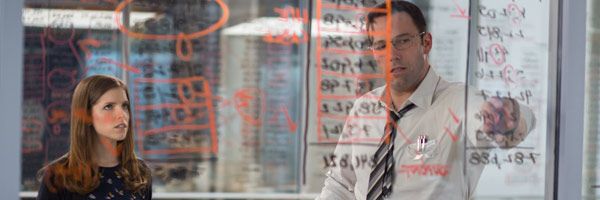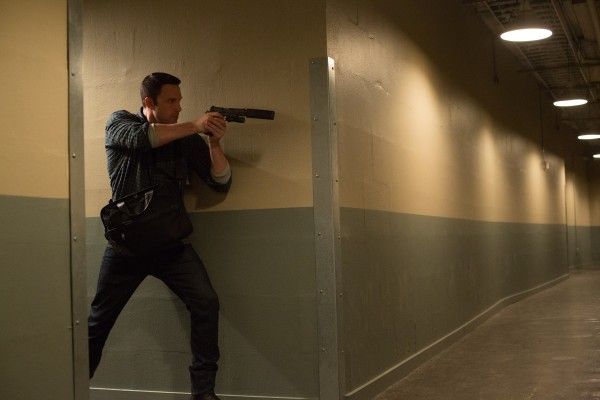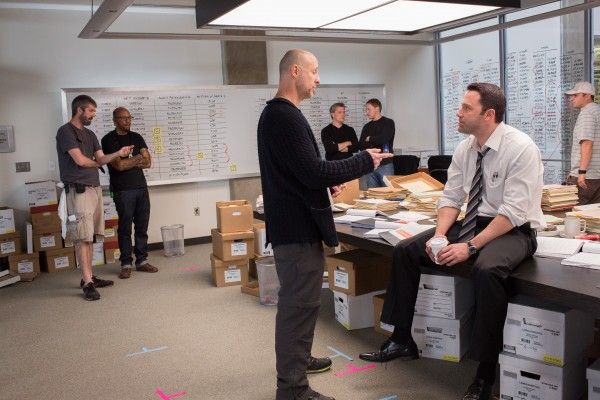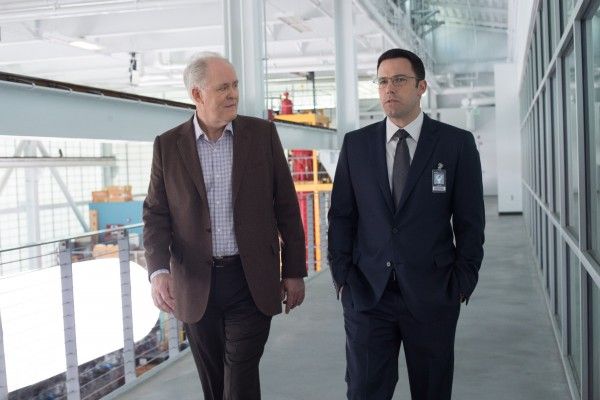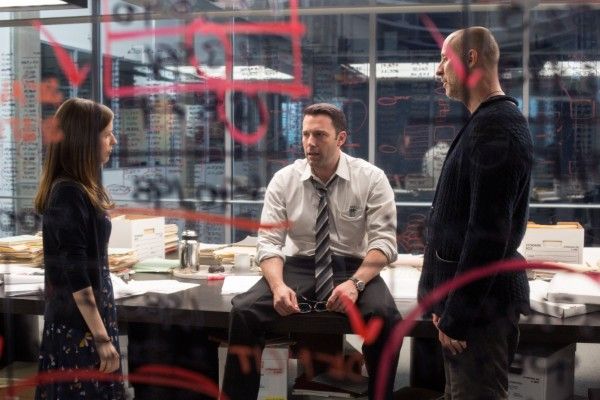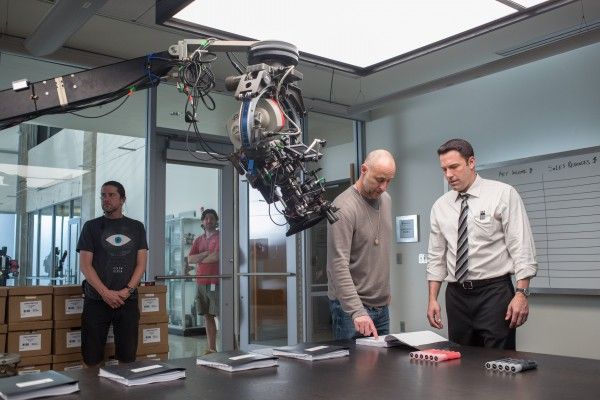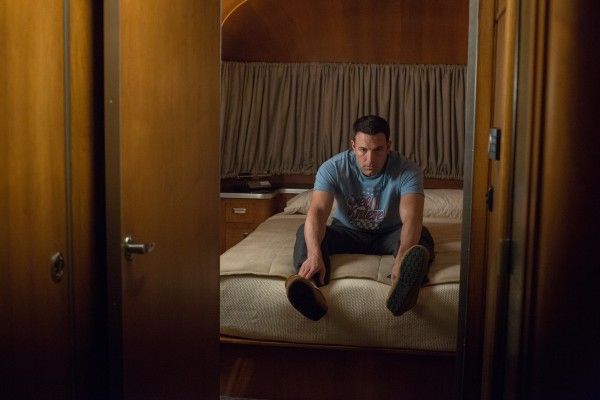The Accountant is a crime drama/thriller with a very unique hero at its center. Christian Wolff (Ben Affleck) is a math savant and small-town CPA, who prefers to spend more time with numbers than people, which works to his advantage as a freelance accountant for some of the world’s most dangerous criminal organizations. When Christian takes on a legitimate client, in the cutting-edge company Living Robotics, a discrepancy involving millions of dollars puts his life in very serious danger. Directed by Gavin O’Connor, the movie also stars Anna Kendrick, J.K. Simmons, Jon Bernthal, Cynthia Addai-Robinson, Jeffrey Tambor, John Lithgow and Jean Smart.
During a conference at the film’s press day, actor Ben Affleck talked about the huge challenge of making this character real, deciding where he fell on the autism spectrum, whether this guy is at all like Bruce Wayne, the intense fight training, properly portraying an autistic hero, what most stood out about the people he met with during the research process, and the importance of variety in his career.
Question: What did you find to be the biggest challenge of this role, and how did you find who you wanted this guy to be?
BEN AFFLECK: It was a very challenging role and it required a lot of research. (Director) Gavin [O’Connor] and I went around and spent time with people who were at various places on the autism spectrum, and observed behavior and talked to them and engaged with them in everything from what their daily life is like to what type of movie they’d like to see about someone with autism. We got a lot of different responses, but really, the value was in grounding the guy and making him like real people we had met and seen in real life, rather than just an imagined version of what it might be. It was a cobbling together of observed behaviors and character traits from people we met. That’s what I anchored the performance in.
How did you decide where you where you wanted him to be on the autism spectrum and what mannerisms you wanted him to have?
AFFLECK: That’s all stuff I just picked up and observed in people. There wasn’t any one person where we thought, “Okay, we’re going to build a character on this guy.” It was more Gavin and I meeting people and observing things, and when we’d see something that felt close to what we were doing in the movie, we’d make a note of it. We wanted to make sure we were doing something realistic and that was rooted in reality, so it was about putting together those behaviors. A lot of them were observed, and some of them were stolen. That’s the way you do it.
Did you work on all of that for a long time?
AFFLECK: Yeah, it was a lot of work because we cared about getting it right. The last thing we wanted to do was a cartoon version, a caricature or an over-simplification because it is a condition that people really have. The more complicated the better because that meant it was more real. The people that we met and talked to all had very complicated situations and lives. There was an amazing spectrum of special gifts that we found. So, it should feel complicated. On the one hand, he does want to connect, and he wants to connect very much, but some things can’t be fixed. He doesn’t connect in a way where he can put his arms around this woman (Anna Kendrick) and kiss her, but he connects with her in another way. Seeing that is what’s complicated and what’s interesting about it.
Is this guy like Bruce Wayne, at all?
AFFLECK: He has the same chin. If you stretch hard enough, you can draw parallels with a lot of different characters, but this is a really distinct, unique character in a unique film. What drew me to it was Gavin and his work, and the fact that it was very unusual. You think you’re getting one kind of movie, and then you get something that’s smarter, more interesting and more challenging, and is thematically resonant for people who are different and what they’re capable of. It’s about how we try to protect our children from home and, in some ways, harm them more by doing so. That’s what interested me about the project.
Did your training as Batman help you with all of the action in this?
AFFLECK: Gavin was very concerned about the action being real and good, which is something he’d done very well in Warrior, for example. So, training was as much a part of this as it was for the Batman movie. In fact, even more so with this because it’s a lot harder for the stuntman to do your stunt when you’re not wearing a mask. So, I had to really be on top of my game and work hard with some really great professionals who were very helpful and really good at the stuff, and they educated me about this fighting style (the Indonesian style of Pentak Silat). It was a learning experience. I have a lot of respect for the guys who do it for a living.
Who would win, if The Accountant had to fight Batman?
AFFLECK: I’ve only thought about beating Jason Bourne. I haven’t thought about that match-up.
Aside from this, you’re also working with J.K. Simmons on the DC films. How did this experience compare?
AFFLECK: It was great to work with J.K. again. I wish we had the chance to do more. Hopefully, we will in the future, so it was a nice tease. It’s also really cool, when you do a part in a movie, you don’t know what the other actors are doing when it’s compartmentalized, like this story is. It was a real treat to get to go and sit down and watch the movie, for the first time, and go, “Oh, that’s what they were up to! I really should have brought my A-game. They’re pretty good!” It’s like seeing the special effects get put into a movie. You’re just out there with a green screen and a tennis ball, and then you watch the movie and it’s an asteroid careening towards Earth. It was similarly pleasantly exciting and surprising, how great their storyline was in the movie, how much it carried the film, and how tight and sharp their acting is. I was just psyched to be in a movie with them.
The father in this movie was pretty harsh with his sons. Did that make you think about your own parenting style, at all?
AFFLECK: Yeah, that’s what I thought was the most heartbreaking thing about the story. That was definitely moving to me. As a parent, I face dilemmas, like we all do every day, about what’s the right way to raise children. And every time, in every little moment, there comes a crossroad and there’s a lot of different parenting choices that you could make. We all make mistakes, for sure, but we try our best. A lot of it is just that when you have kids, your heart is outside of your body and you feel so vulnerable. The fear of your child being vulnerable is very, very powerful, and I can see how that makes for a really interesting character with the father. It’s a guy who, out of love, compassion and fear for his son, ends up brutalizing him and abusing him. It’s a really interesting look at what’s the appropriate way to channel the intense emotion we have, as parents. It’s not easy.
This has to be one of the first autistic heroes in film. Was there anything you were most worried about getting right?
AFFLECK: What we wanted to do was be respectful and be accurate, and to tell a truthful story. We didn’t want to try to sex it up or gloss over things. We just wanted to peer into the reality of that life. Also, I think it was a good thing showing that different can be good, better and special. Obviously, anytime you’re gonna deal with a real-life issue like this, that touches people lives and that is really important to some people, there are going to be a lot of people with really strong opinions and feelings. Our hope is that people in that community, who are on the spectrum of autism, like the movie and like that it’s a superhero story about them. That was what I got from the people that I met with. That’s what they wanted to see. That’s what they were excited about, so I hope that’s what we deliver on.
Is this the most complex character you’ve ever played?
AFFLECK: Yeah, it’s definitely the most complicated and interesting character that I’ve played, for sure.
When you met with individuals on the autism spectrum, what most struck you about them?
AFFLECK: One thing that struck me was how funny and how much wit people had, who had Asperger’s. There were a lot of laughs and a lot of funny observations. I wanted to keep that aspect of the wry, observational, detached behavior. But humor is such a powerful form of intelligence and I was really moved by then, so I wanted to include some of that. It’s a fine line. We didn’t want to make fun of this character, but he is witty, the way he sees the world in his own unique way.
How did they react to meeting you?
AFFLECK: The Batman character has a lot of fans. It turns out that’s a well-known character, so that was fun. I don’t think the movie had come out yet, though. There are some people on the spectrum who, just because of the way their social thinking works, they don’t observe the same social niceties or have certain tact. I remember one girl was like, “I’ve never heard of you! Who are you?!” And I was like, “I’m just an actor.” I got a lot of fun reactions. But the truth is, the biggest reaction was that people were psyched to be a part of making a movie. They understand that they were coming up with ideas for a character. They really wanted to volunteer and help out. It was also educational because I had this idea of autism being withdrawn, but these people were actually quite enthusiastic, engaged and fired up about participating, in their own unique ways.
What do you get as a director that’s different from what you get as an actor?
AFFLECK: Movies are all about the director. I’ve learned that, finally. When you work with a director, you’re on his or her ship, and you’re going in that direction. Your job is to be creative and bring forth your ideas, but fulfil their vision of how they’re telling their whole story. You’re responsible for your performance, but you have to be as tuned to the director as possible, try to follow through with their vision, and make their movie. It’s very satisfying to feel like you’re on the same page with someone like Gavin [O’Connor], who’s also really interested, engaged, thoughtful and thought-provoking, as the process was going on. The nice thing about acting is that, if the set falls down, you can just go back to your trailer and be like, “I’ll come back when you figure it out.” So many things are not my problem, as an actor. It’s very, very nice.
Now that you’re working in such a gigantic franchise playing Batman, is it important for you, at this point, to take a complex role like this, as well as create one of your own, in your forthcoming directorial film, Live By Night?
AFFLECK: It’s important for me. I’m not much of a tactician when it comes to what a career should look like. I’m not a big believer in that strategic level of planning. It’s more about projects that interest me and move me, and part of that is variation. You would get bored doing the same thing, over and over again. With Batman, The Accountant and Live By Night, I’m lucky that I’ve had the chance to do things that are completely different. It keeps me activated and engaged, and hopefully doing my best work.
Does that allow you more freedom, going back to the Batman character for the forthcoming film?
AFFLECK: It’s too far away to talk about that.
The Accountant opens in theaters on October 14th.

